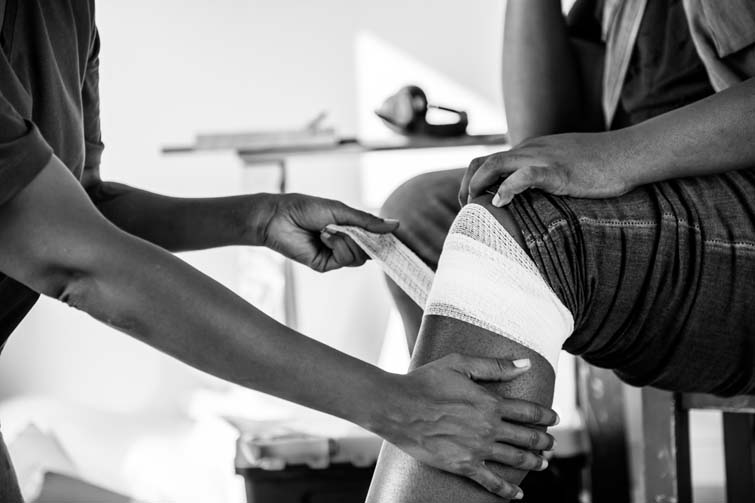
Workplace injuries can significantly impact individuals and businesses, leading to decreased productivity, increased healthcare costs, and potential legal ramifications. We’ll delve into some of the most common workplace injuries and explore how urgent care centers in Danbury, CT, play a crucial role in providing prompt and effective medical attention.

In any work setting, safety should be a top priority. However, workplace injuries can still occur despite best efforts, affecting employees and employers. We will examine the causes, the far-reaching impact these accidents can have, and the crucial role that urgent care in Danbury, CT, plays in addressing such injuries.
Slips, trips, and falls are some of the most common workplace injuries and the most preventable. These seemingly innocuous accidents can have severe consequences, leading to injuries that range from minor bruises to debilitating fractures. Here are the causes and risk factors of slips, trips, and falls and why prompt urgent care in Danbury, CT, is crucial.
Slips occur when there’s a lack of traction between the footwear and the walking surface, while trips happen when a person’s foot strikes an object, causing a loss of balance. The combined effect of these accidents results in falls, which can lead to various injuries that need urgent care in Danbury, CT. Several factors contribute to these incidents:
Slips, trips, and falls can have far-reaching consequences that need urgent care in Danbury, CT.
For employees, these accidents can lead to:
For employers, the impact can be equally significant:
The good news is that slips, trips, and falls can be largely prevented through proactive measures. Employers and employees can collaborate to create a safer work environment by implementing the following preventive strategies:
Slips, trips, and falls can have significant consequences for both employees and employers, but with proactive preventive measures and the availability of urgent care centers in Danbury, CT, the impact of these accidents can be mitigated.
In today’s modern workplace, the rise of technology and repetitive tasks has led to a surge in Repetitive Strain Injuries (RSIs). These injuries, also known as cumulative trauma disorders, develop gradually due to repetitive motions, awkward postures, and sustained muscle contractions. We’ll underscore the importance of ergonomics and explore how urgent care centers in Danbury, CT, can provide effective relief for individuals suffering from these ailments.
Several specific RSIs are prevalent, each affecting different parts of the body and requiring urgent care in Danbury, CT:
Preventing RSIs begins with ergonomics – the science of designing a workspace to fit the human body’s needs. Proper ergonomics can significantly reduce the risk of RSIs and other workplace-related injuries that need urgent care in Danbury, CT. Key ergonomic considerations include:
Repetitive Strain Injuries can impact an individual’s quality of life and hamper workplace productivity. By understanding the nature of RSIs, recognizing the different types, prioritizing ergonomics, and seeking timely care from urgent care centers in Danbury, CT, individuals can find relief and take steps toward recovery.

Lifting and handling injuries are a significant concern in workplaces where manual lifting and moving of heavy objects are commonplace. While such activities are necessary in many industries, they can lead to a range of injuries if not executed with proper techniques. Let’s see how urgent care centers in Danbury, CT, play a pivotal role in treating acute lifting and handling injuries.
Lifting heavy objects improperly can place tremendous strain on the back, neck, and other parts of the body. The spine is particularly vulnerable to injury when lifting techniques are not adhered to. By following proper lifting techniques, individuals can significantly reduce the risk of injury that needs urgent care in Danbury, CT:
Failing to employ proper lifting techniques can result in a range of injuries that require urgent care in Danbury, CT, including:
The first line of defense against lifting and handling injuries is proper training and education. Employers can take proactive steps to prevent injuries by providing:
Lifting and handling injuries are preventable with proper techniques, training, and education. By prioritizing correct lifting methods, educating employees, and fostering a safe working environment, businesses can significantly reduce the occurrence of lifting-related injuries. However, accidents can still happen, and that’s where urgent care centers in Danbury, CT, play a crucial role.
Machinery accidents pose a significant risk in workplaces that rely on heavy equipment and machinery to perform various tasks. These accidents can result in severe injuries and even fatalities if proper safety measures are not in place. We’ll explore the types of injuries commonly associated with machinery accidents and emphasize the role of urgent care centers in Danbury, CT, in providing timely and effective care for those affected by machinery accidents.
Machinery accidents can lead to various injuries, each needing urgent care in Danbury, CT, depending on severity. Some common types of machinery-related injuries include:
Preventing machinery accidents requires strict adherence to safety protocols and procedures and urgent care in Danbury, CT:
In the aftermath of a machinery accident, immediate medical assessment and treatment from urgent care centers in Danbury, CT
Machinery accidents underscore the importance of stringent safety protocols and the need for immediate medical attention. By prioritizing safety measures, adhering to protocols, and partnering with reputable urgent care centers in Danbury, CT, businesses can ensure that their employees receive timely and comprehensive care in the event of a machinery accident.

Workplaces come with their fair share of hazards, and cuts, burns, and abrasions are some of the most common injuries that employees can face. These incidents can arise from various occupational hazards, ranging from sharp tools to hot surfaces. We’ll delve into the hazards that lead to cuts, burns, and abrasions and highlight the specialized wound care provided by urgent care centers in Danbury, CT.
Cuts, burns, and abrasions can result from a variety of workplace hazards:
The severity of cuts, burns, and abrasions can vary greatly, from minor wounds that require simple first aid to more severe injuries that demand immediate medical attention. Complications can arise if these injuries are not treated properly:
In the event of cuts, burns, or abrasions, prompt first aid is essential to minimize complications:
Workplace injuries can occur unexpectedly, and swift and appropriate medical attention is essential to ensure the well-being of the injured individual. Urgent care centers in Danbury, CT, play a crucial role in providing immediate care, accurate diagnostics, a range of treatment options, and facilitating referrals for specialized care when necessary.
When a workplace injury occurs, immediate medical attention is critical to assess the extent of the injury and initiate the appropriate treatment. Urgent care centers offer several advantages in this regard:
Accurate diagnosis is the foundation of effective treatment. Urgent care centers in Danbury, CT, are equipped with various diagnostic tools to evaluate the extent of workplace injuries:
Urgent care centers offer a wide array of treatment options for workplace injuries, ensuring that individuals receive the care they need to recover:
Workplace injuries may sometimes require specialized care beyond what urgent care centers can provide. In such instances, urgent care centers facilitate referrals and follow-up care:
Urgent care centers in Danbury, CT, play a pivotal role in managing workplace injuries by providing immediate medical attention, utilizing advanced diagnostic capabilities, offering various treatment options, and facilitating referrals and follow-up care.
Workplace injuries can be disruptive, leading to physical discomfort, decreased productivity, and increased healthcare costs. One center that stands out for its commitment to quality care is DOCS Urgent Care – Danbury. By working with us, you can address these challenges head-on with immediate medical attention, accurate diagnostics, and a range of treatment options. Contact us to learn more.


During this surge in COVID-19 cases, our primary focus is meeting the high demand for tests, and we are seeing higher than usual wait times. This means we are unable to answer most phone calls. Please know that our teams are working very hard during this time to care for as many patients as safely as possible. Please click the button below for answers to common questions. We appreciate your understanding.